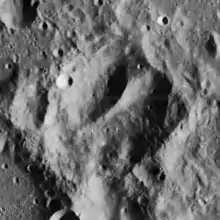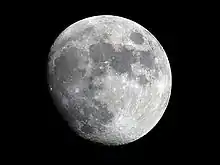Delaunay (crater)
Delaunay is a lunar impact crater. It was named after French astronomer Charles-Eugène Delaunay.[1] The craters La Caille to the southwest and Faye to the northeast border on the outer rim of Delaunay. Further to the northwest is the prominent Arzachel.
 Lunar Orbiter 4 image | |
| Coordinates | 22.2°S 2.5°E |
|---|---|
| Diameter | 46 km |
| Depth | 1.9 km |
| Colongitude | 358° at sunrise |
| Eponym | Charles-Eugène Delaunay |
This is an irregular crater formation that has an interior ridge running from the northeast side that divides the crater nearly in half, and gives it a heart-shaped appearance. This ridge grows increasingly slender as it approaches the southwest rim, until it terminates at sharp point, giving it the appearance of a curved fang. The outer rim of this crater is equally irregular, and the uneven inner wall varies significantly in width. The southern rim in particular has been heavily damaged by impacts, including La Caille E which intrudes into the interior.
Satellite craters
By convention these features are identified on lunar maps by placing the letter on the side of the crater midpoint that is closest to Delaunay.
| Delaunay | Latitude | Longitude | Diameter |
|---|---|---|---|
| A | 21.9° S | 2.0° E | 6 km |
References
- "Delaunay (crater)". Gazetteer of Planetary Nomenclature. USGS Astrogeology Research Program.
- Andersson, L. E.; Whitaker, E. A. (1982). NASA Catalogue of Lunar Nomenclature. NASA RP-1097.CS1 maint: ref=harv (link)
- Bussey, B.; Spudis, P. (2004). The Clementine Atlas of the Moon. New York: Cambridge University Press. ISBN 978-0-521-81528-4.CS1 maint: ref=harv (link)
- Cocks, Elijah E.; Cocks, Josiah C. (1995). Who's Who on the Moon: A Biographical Dictionary of Lunar Nomenclature. Tudor Publishers. ISBN 978-0-936389-27-1.CS1 maint: ref=harv (link)
- McDowell, Jonathan (July 15, 2007). "Lunar Nomenclature". Jonathan's Space Report. Retrieved 2007-10-24.CS1 maint: ref=harv (link)
- Menzel, D. H.; Minnaert, M.; Levin, B.; Dollfus, A.; Bell, B. (1971). "Report on Lunar Nomenclature by the Working Group of Commission 17 of the IAU". Space Science Reviews. 12 (2): 136–186. Bibcode:1971SSRv...12..136M. doi:10.1007/BF00171763.
- Moore, Patrick (2001). On the Moon. Sterling Publishing Co. ISBN 978-0-304-35469-6.CS1 maint: ref=harv (link)
- Price, Fred W. (1988). The Moon Observer's Handbook. Cambridge University Press. ISBN 978-0-521-33500-3.CS1 maint: ref=harv (link)
- Rükl, Antonín (1990). Atlas of the Moon. Kalmbach Books. ISBN 978-0-913135-17-4.CS1 maint: ref=harv (link)
- Webb, Rev. T. W. (1962). Celestial Objects for Common Telescopes (6th revised ed.). Dover. ISBN 978-0-486-20917-3.CS1 maint: ref=harv (link)
- Whitaker, Ewen A. (1999). Mapping and Naming the Moon. Cambridge University Press. ISBN 978-0-521-62248-6.CS1 maint: ref=harv (link)
- Wlasuk, Peter T. (2000). Observing the Moon. Springer. ISBN 978-1-85233-193-1.CS1 maint: ref=harv (link)
